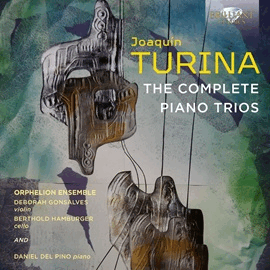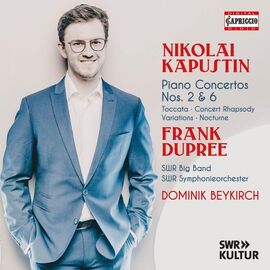Dieses neue Kapustin-Album startet energetisch mit den Variationen op. 3 und der Toccata op. 8 für Klavier & Big Band und zeigt einen hoch virtuosen Frank Dupree in diesen zwei fetzigen Kapustin-Stücken.
Das 2. Klavierkonzert des ukrainischen Komponisten ist ein weiteres Meisterwerk, das er komponierte, als er etwa 35 Jahre alt war. Zu diesem Konzert zirkuliert eine Geschichte, die interessant genug ist, um hier davon zu berichten. Angeblich hatte Kapustin der damals im Orchester von Boris Karamaschiw arbeitete, kein Notenpapier, weil dieses in der kommunistischen Sowjetunion eine Seltenheit war. Um Notenpapier zu bekommen, musste man entweder eine Verbindung zur Musikausbildung haben oder Mitglied der Gewerkschaft der Komponisten sein, was Kapustin nicht war. Er ließ sich daher von Karamaschiw Blanko-Notenpapier geben, um dieses Stück zu schreiben…
Der persönliche, vom Jazz beeinflusste Stil des ukrainischen Komponisten ist in diesem Konzert auf seinem Höhepunkt, und die Aufführung ist absolut fabelhaft. Dupree und das SWR-Orchester spielen mit ungehemmter Spielfreude, und einem unwiderstehlichen rhythmischen Schwung.
Nach so viel Energie bringt das Nocturne etwas Ruhe und zeigt, wie originell Kapustin auch in seinem solchen Stück sein konnte.
Die Konzert Rhapsodie für Klavier und Orchester beginnt mit einem ruhigen Einleitung, die Dupree sehr lyrisch spielt und ist gefolgt von einem brillanten Scherzo, einer Humoreske, die eine kraftvolle Synthese aus energiegeladenem Jazz und klassischer Virtuosität ist und hier mehr humorig und verspielt dargeboten wird als in Kapustins eigener Aufnahme.
Das Klavierkonzert Nr. 6 aus dem Jahr 1993 ist ein weitaus komplexeres Stück als das vierte Konzert, mit überraschenden Stimmungs- und Tempowechseln. Das ergibt im ersten und im letzten Satz eine faszinierend Szenerie, die so tänzerisch ist, dass man sich gut ein fulminantes Ballett darauf vorstellen könnte. Dazwischen steht ein notturnohafter langsamer Satz voller sinnierender Melancholie.
Und so ist Frank Dupree eine weiteres Kapustin-Album gelungen, das sich mühelos an die Spitze der Diskographie setzt und mit gekonntem Eintreten für eine immer noch zu wenig bekannte Musik nicht hoch genug bewertet werden kann.
This new Kapustin album starts energetically with the Variations op. 3 and the Toccata op. 8 for piano & big band and shows a highly virtuoso Frank Dupree in these two groovy Kapustin pieces. The Ukrainian composer’s 2nd Piano Concerto is another masterpiece that he composed when he was about 35 years old. A story is circulating about this concerto that is interesting enough to tell here. It is said that Kapustin, who worked in Boris Karamashiv’s orchestra at the time, had no music paper because it was a rarity in the communist Soviet Union. To get music paper, you either had to have a connection to music education or be a member of the composers’ union, which Kapustin was not. He therefore had Karamashiv give him blank music paper to write this piece… The Ukrainian composer’s personal, jazz-influenced style is at its peak in this concerto, and the performance is absolutely fabulous. Dupree and the SWR orchestra play with uninhibited joy, and an irresistible rhythmic drive.
After so much energy, the Nocturne brings some calm and shows how original Kapustin could be even in his piece like this. The Concerto Rhapsody for piano and orchestra begins with a quiet introduction, which Dupree plays very lyrically, and is followed by a brilliant Scherzo, a humoresque that is a powerful synthesis of energetic jazz and classical virtuosity, presented here with more humor and playfulness than in Kapustin’s own recording. The Piano Concerto No. 6 from 1993 is a far more complex piece than the fourth concerto, with surprising changes of mood and tempo. This results in fascinating scenery in the first and last movements, which is so dance-like that one could easily imagine a brilliant ballet on it. In between, there is a notturno-like slow movement full of pensive melancholy.
And so Frank Dupree has succeeded in creating another Kapustin album that effortlessly takes its place at the top of the discography and cannot be praised highly enough for its skillful advocacy of music that is still too little known.


















